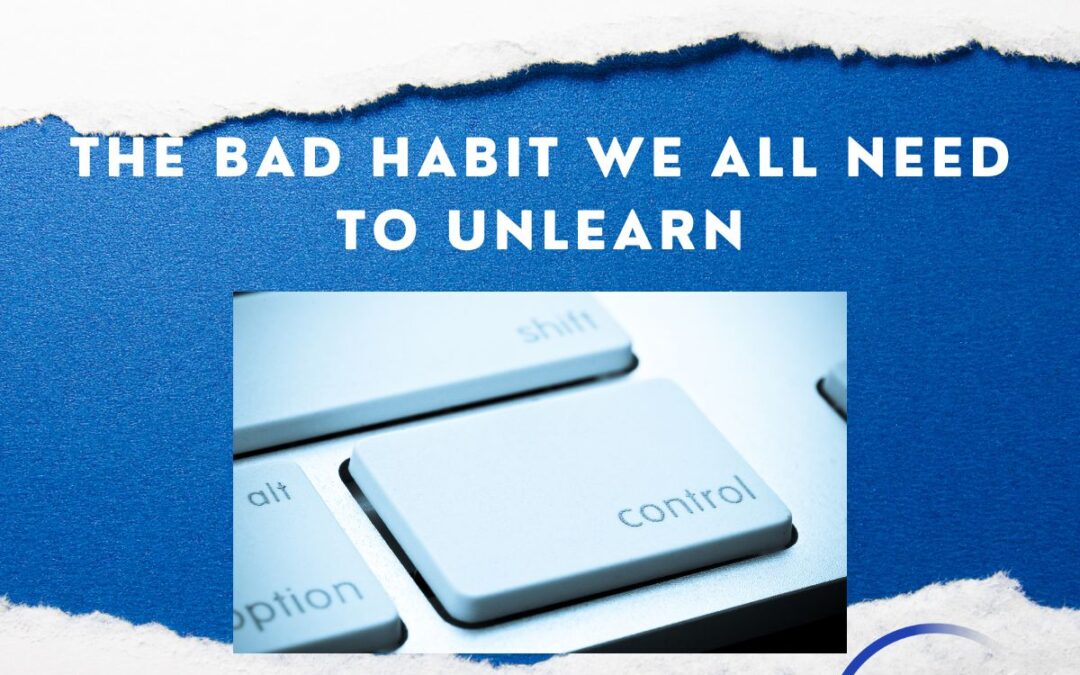How do you define success?
Success is often measured by our ability to adapt, innovate, and collaborate effectively. However, there’s one pervasive habit that can silently undermine our efforts and hinder our progress: the relentless need to control everything. Take it from me, I know this feeling well! From micromanaging tasks to obsessing over outcomes, this habit can have far-reaching consequences, impacting productivity, creativity, and relationships in the workplace. In this article, I’ll delve into the roots of this habit, explore its detrimental effects, and uncover strategies to break free from its grip, allowing people who have this habit to unlock their full potential and thrive in both personal and professional endeavors.
The Illusion of Control
Many of us struggle with this. Keep reading and see if you recognize yourself doing any of these 4 things regularly. Don’t worry, habits are just learned behaviors. Included in each section are suggestions on how to break these control habits.
- Micromanaging Tasks
Micromanagement is a prevalent issue in many workplaces, fueled by a desire to ensure everything is executed perfectly. However, this approach often backfires, leading to decreased morale, disempowered team members, and a stifling of innovation. Research has shown that employees who feel micromanaged are more likely to experience stress and burnout, resulting in decreased job satisfaction and lower productivity. Instead of micromanaging tasks, leaders should focus on fostering a culture of autonomy and trust, empowering team members to take ownership of their work and contribute their unique perspectives and talents.
- Obsessing Over Outcomes
While it’s natural to have goals and aspirations, obsessing over specific outcomes can blind us to new opportunities and hinder our ability to adapt to changing circumstances. The fear of failure or the need for validation can drive this fixation on outcomes, leading to increased stress and anxiety. Studies have shown that individuals who are overly focused on outcomes are more likely to experience negative emotions such as frustration and disappointment when things don’t go as planned. Instead of fixating on outcomes, we should embrace a more process-oriented mindset, focusing on the journey rather than the destination, and viewing setbacks as valuable learning experiences that contribute to our growth and development.
- Controlling Others’ Motivation
Attempting to control or manipulate others’ motivation is a common pitfall for leaders and managers, often stemming from a desire to achieve specific results or maintain authority. However, this approach can lead to resentment, disengagement, and a breakdown of trust within teams. Research has shown that employees who feel micromanaged or manipulated are less likely to be motivated and engaged in their work, resulting in decreased performance and higher turnover rates. Instead of trying to control others’ motivation, leaders should focus on fostering a supportive and inclusive work environment where individuals feel valued, empowered, and encouraged to contribute their best efforts.
- Influencing Management
Managing upwards in an attempt to control our superiors’ actions, decisions, or perceptions, is a delicate balancing act that can have unintended consequences. While it’s essential to communicate effectively and advocate for our needs, trying to control our boss’s behavior or reactions can damage our professional relationships and undermine our credibility. Research has shown that employees who engage in managing up behaviors are often perceived as manipulative or insincere, leading to strained relationships and decreased opportunities for advancement. Instead of trying to control our superiors, we should focus on building trust and credibility through open and honest communication, demonstrating our value through our actions and contributions.
Breaking Free of Control Controlling Us
Does any of this sound familiar? If yes, how do we break free from this habit that can obviously have a severe impact on relationships with our colleagues, managers, and team? In addition to the suggestions listed above, we also need to start doing these two things.
Embracing Flexibility
At its core, the urge to control is often driven by fear – fear of failure, of uncertainty, of losing control. However, true strength lies in embracing flexibility and adaptability, recognizing that change is inevitable and that our ability to navigate uncertainty is a valuable skill in today’s fast-paced world. Research has shown that individuals who embrace flexibility are better able to cope with stress, navigate change, and thrive in dynamic environments. By cultivating a growth mindset and embracing change as an opportunity for learning and growth, we can free ourselves from the grip of control and open ourselves up to new possibilities and opportunities.
Cultivating Trust
Trust is the foundation of strong relationships and high-performing teams. When trust is lacking, individuals are less likely to collaborate, take risks, or share their ideas openly. Research has shown that organizations with high levels of trust experience higher levels of employee engagement, satisfaction, and retention, as well as greater innovation and productivity. By cultivating trust within our teams and across the organization, we create an environment where individuals feel safe to take risks, share their ideas, and collaborate effectively. This begins with leaders demonstrating trustworthiness through their actions, decisions, and communication, and fostering a culture of transparency, integrity, and mutual respect.
So there you have it. The habit of trying to control everything at work is a common yet subtle barrier to success. By recognizing the detrimental effects of this habit and taking proactive steps to break free from its grip, we can unlock our full potential, foster stronger relationships, and achieve greater fulfillment in our professional lives. By relinquishing control and fostering an environment of trust and adaptability, we can create more collaborative and trusting relationships.
I want to hear from you. Do you personally struggle with this, or know someone who does? Drop into my DM’s. My social media buttons are below.
#ControllingHabits #WorkplaceMindset #ProfessionalGrowth #LeadershipInsights

